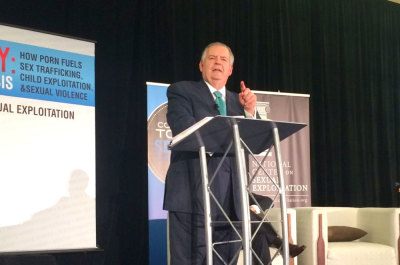Broad Coalition of Evangelicals Releases 'Nashville Statement' on Human Sexuality, Identity

A broad coalition of Christian leaders, including J. I. Packer and Francis Chan, have released a statement articulating God's design for human identity as male and female. Such a statement is needed, they say, in order to resist the spirit of the age and for the church to maintain its counter-cultural witness in a world that seems "bent on ruin."
The Nashville Statement, which was sponsored by the Council on Biblical Manhood and Womanhood and the Ethics & Religious Liberty Commission was published Tuesday. The document contains a preamble and 14 articles responding to the current realities in the Western world regarding the many messages swirling in society and even in some churches about sexuality, particularly homosexuality and transgenderism, which have come to the fore in both politics and church life in recent years.
"Evangelical Christians at the dawn of the twenty-first century find themselves living in a period of historic transition. As Western culture has become increasingly post-Christian, it has embarked upon a massive revision of what it means to be a human being. By and large the spirit of our age no longer discerns or delights in the beauty of God's design for human life," the statement's preamble reads.

"The answer to the question 'What and who is a human being?' is the mega-ethical issue of our time. It impacts everything," Richard Land explained to The Christian Post. Land is the president of Southern Evangelical Seminary near Charlotte, North Carolina, and is one of the Nashville Statement's initial signatories.
He noted that if the meaning of the human person cannot be defined in Scripture, the very Gospel is at stake.
"This statement is an attempt to equip the Church to address this issue from a biblical, Christian perspective," Land said, "to provide a catechism for churches, for Bible study groups, for Sunday schools, families, college students, to equip themselves to understand what the Bible says about these issues and to do so in a positive way."
"And if we truly love people, we are going to tell them the truth," he emphasized, "and telling the truth to people is often hard. Telling the truth to segregationists about race was not easy. But they were trapped in racism. It stultified their souls and they were accountable to God for it and it was our responsibility as Christians to tell them the truth: God is no respecter of persons."
Some of the articles in the Nashville Statement say:
Article 4
WE AFFIRM that divinely ordained differences between male and female reflect God's original creation design and are meant for human good and human flourishing.
WE DENY that such differences are a result of the Fall or are a tragedy to be overcome.
Article 7
WE AFFIRM that self-conception as male or female should be defined by God's holy purposes in creation and redemption as revealed in Scripture.
WE DENY that adopting a homosexual or transgender self-conception is consistent with God's holy purposes in creation and redemption.
The statement's initial signatories include a multigenerational and racially diverse array of men and women leaders in the body of Christ from a variety of denominations. Over 100 prominent theologians, Bible scholars, church pastors and ministry leaders, seminary presidents, college professors, Christian public policy thinkers, and writers have all already signed on. Baptists, Anglicans, Pentecostals, Presbyterians, nondenominational evangelicals, and almost every other historic Orthodox Protestant tradition are represented among those signatures and additional signers continue to be added.
When one engages sexuality issues, Land said, one must deal with the doctrine of creation, and specifically God's creation of human beings. Although marred and twisted by the Fall, human beings are the only part of His created order that are imprinted with the divine image, he added, and that divine image cannot be separated from His plan for marriage and human sexuality.

Katie McCoy, assistant professor of theology in women's studies at Southwestern Baptist Theological Seminary in Forth Worth, Texas, commented to CP, "The gender issues facing women today hit at the core of our being. McCoy, who is also the editor of BiblicalWoman.com, is among the Nashville Statement's initial signatories.
"And every woman needs to be reconciled to her Creator in Christ. And we were made by God, for God, but when we tinker with what God has given us to reveal Himself, especially our gender, we're distorting what it means to be created in His image," she said.
The authors of the Nashville Statement assert in article 10 that matters pertaining to sexuality, including homosexual practice and transgenderism is an not an area where faithful Christians can "agree to disagree," but that this is central to the Gospel message.
Like the doctor who has to give his patient a troubling cancer diagnosis, "we are but messengers to say here's the bad news. The bad news is that until you're reconciled to Christ you're going to be out of sync with your own self," McCoy continued.
"We're not going to even have reconciliation within our own souls. And so if we distort that truth, we're distorting also that whole-person salvation that Christ came to give us."
"But we're not the cure; Christ is the cure, and all we can do is point to Him. But if we try to say that 'oh, it's fine, we can just sort of sweep this under the rug' or do some hermeneutical gymnastics to make [the apostle] Paul say something that he didn't, we are not only distorting the truth we are in effect limiting the salvation of Christ to say Jesus can't get this far, He can't handle this kind of problem, He can't undo or untangle this kind of pain or past," she said.
When asked what she wants the Nashville Statement to accomplish in the Kingdom of God and how it marks this present moment in church history, McCoy said she hopes it brings boldness to everyone to proclaim the timeless truths of Scripture.
"[Theological] orthodoxy will be increasingly unaccepted and unacceptable but with a statement like this comes the reminder that we are not as alone [as we think], that the truth is never quite on the fringes," McCoy said.
"And God's people will remain faithful to God's Word no matter how unpopular it is, no matter how culturally unacceptable it is."





























